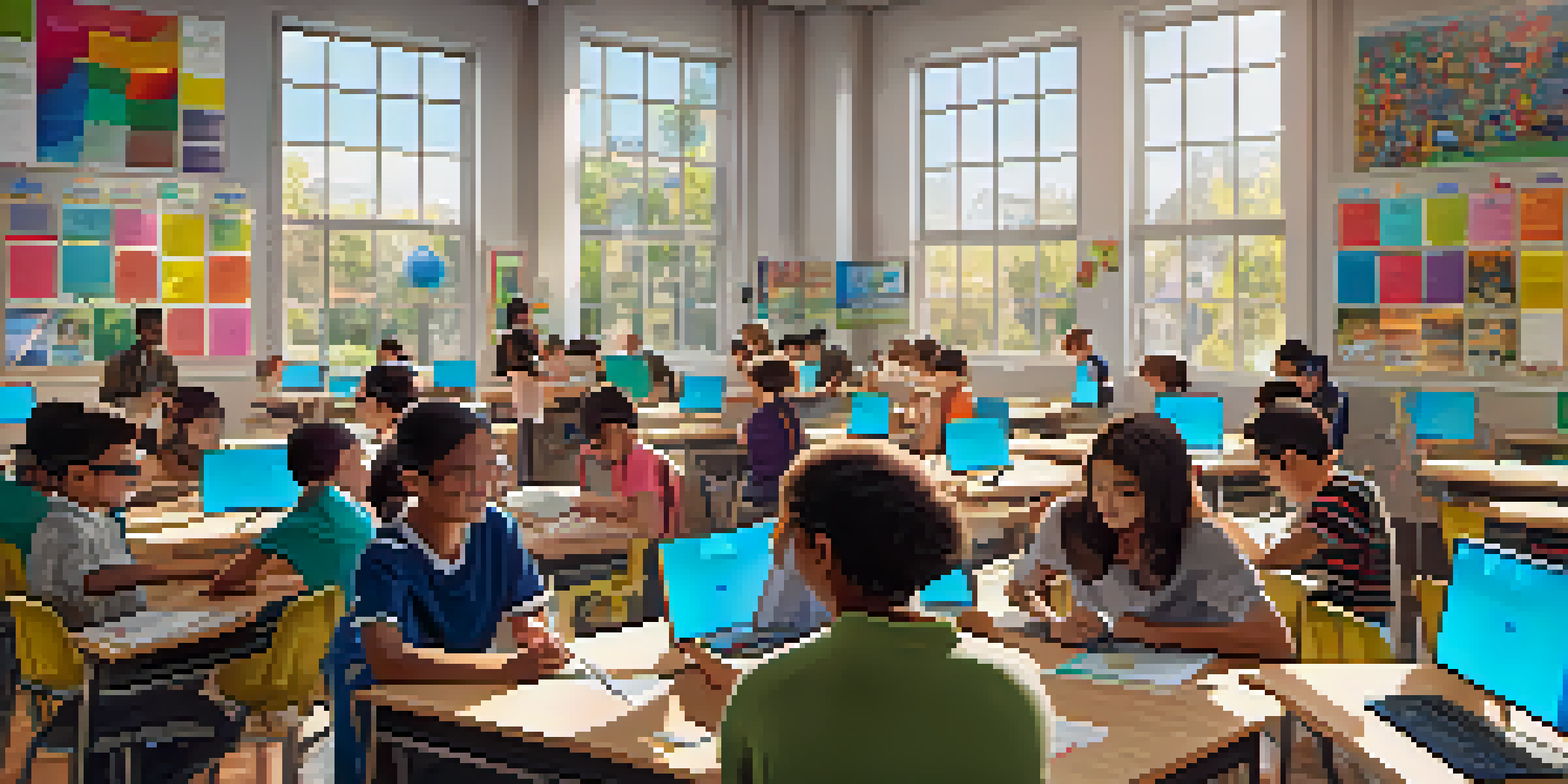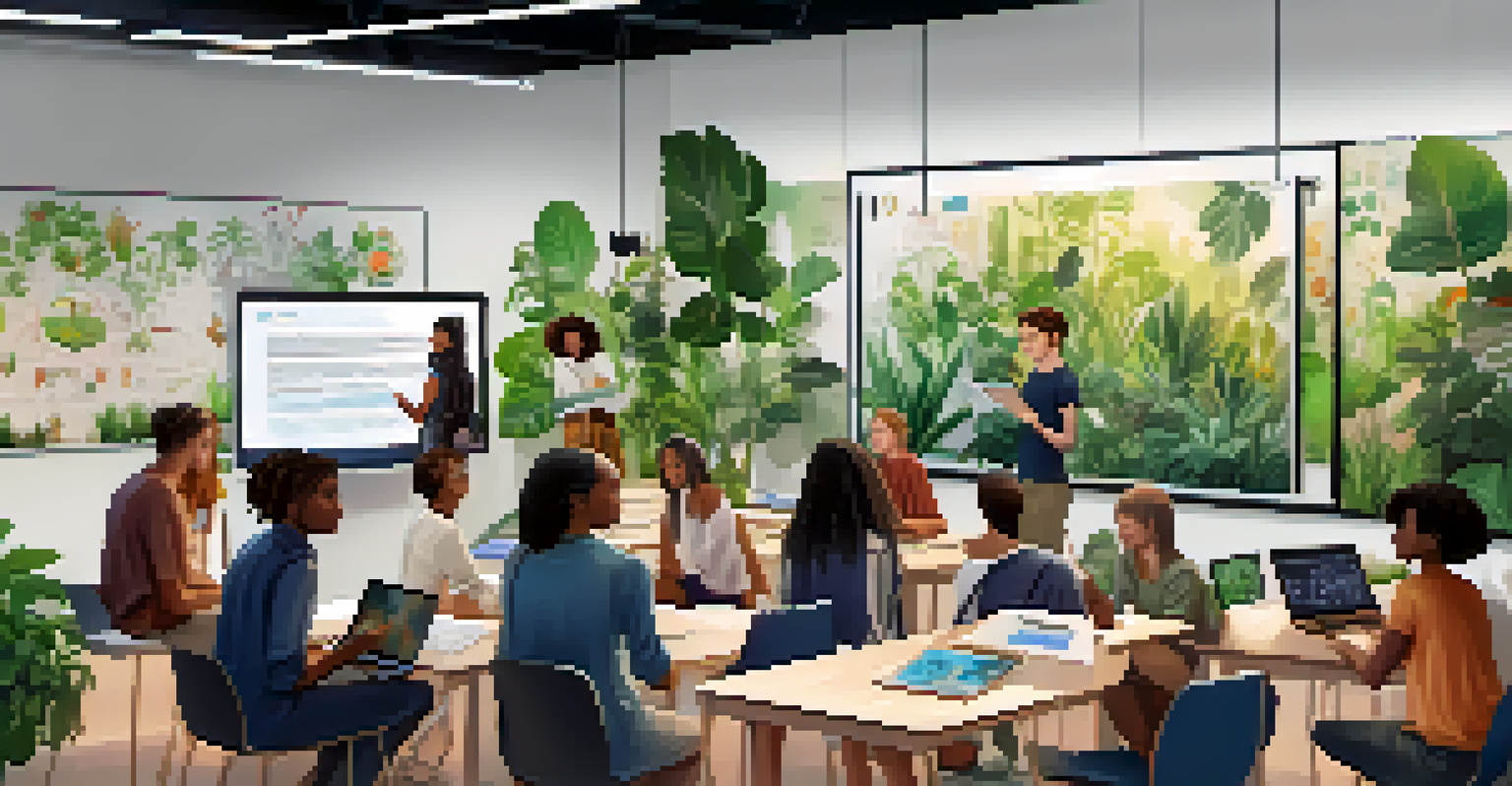Future Trends in Adaptive Learning Technologies and Methods

The Rise of Artificial Intelligence in Learning
Artificial intelligence (AI) is revolutionizing the landscape of adaptive learning. By analyzing individual learning patterns, AI can customize educational experiences tailored to each student’s needs. Imagine a classroom where every lesson adapts in real-time based on a student's performance, making learning more personalized and effective.
The great thing about a digital learning environment is that it can be customized to meet the needs of every student, allowing for personalized learning experiences.
As AI continues to evolve, its ability to predict student outcomes will improve, allowing educators to intervene at the right moments. For instance, if a student struggles with a specific concept, the system can automatically provide additional resources and support. This proactive approach not only enhances learning but also builds student confidence.
Moreover, AI-driven platforms can gather vast amounts of data, enabling educators to better understand group dynamics and overall performance trends. This information is invaluable for refining curricula and addressing learning gaps, ensuring that no student is left behind in their educational journey.
Integration of Virtual and Augmented Reality
Virtual reality (VR) and augmented reality (AR) are emerging as powerful tools in adaptive learning. These technologies create immersive environments where students can engage with content in interactive ways, making lessons more relatable and memorable. Picture a biology class where students can explore the human body in 3D — it’s a game-changer!

By incorporating VR and AR into learning experiences, educators can cater to various learning styles. Visual learners, for instance, benefit greatly from seeing concepts in action, while kinesthetic learners engage more deeply when they can manipulate their environment. This multisensory approach holds the potential to enhance retention and understanding.
AI Personalizes Learning Experiences
Artificial intelligence tailors educational experiences to individual students' needs, enhancing engagement and effectiveness.
Furthermore, as these technologies become more accessible, we can expect to see them integrated into everyday classrooms. Schools equipped with VR headsets or AR applications will not only enrich the curriculum but also prepare students for a technology-driven future.
Personalized Learning Paths for Every Student
One of the most compelling trends in adaptive learning is the creation of personalized learning paths. Instead of a one-size-fits-all approach, adaptive technologies will allow students to progress at their own pace, focusing on areas that require more attention. This method respects individual differences and promotes a deeper understanding of the material.
Technology will not replace great teachers, but technology in the hands of great teachers can be transformational.
Imagine a math curriculum that adjusts based on a student’s mastery of concepts. If a student excels in geometry but struggles with algebra, the adaptive learning platform can provide tailored resources and challenges that address that gap. This targeted approach not only supports learning but also fosters a sense of achievement.
As educators harness the power of data analytics, they can craft these personalized paths more effectively. Continuous assessment and feedback mechanisms will ensure that students remain engaged and motivated as they navigate their educational journey.
The Role of Gamification in Adaptive Learning
Gamification is becoming a key component of adaptive learning strategies. By incorporating game elements such as challenges, rewards, and progress tracking, learning can feel less like a chore and more like an adventure. This engaging approach can significantly enhance motivation and retention, especially among younger learners.
For example, imagine a history lesson transformed into a quest where students earn points for completing tasks and answering questions. This not only makes learning fun but also encourages friendly competition, driving students to achieve their best. Gamification taps into the natural human desire for achievement and recognition.
Immersive Learning with VR and AR
Virtual and augmented reality technologies create interactive environments that cater to diverse learning styles and improve retention.
As adaptive learning platforms continue to integrate gamified elements, we can expect to see increased student participation and improved outcomes. The synergy between gaming and education can create a dynamic learning environment where students thrive.
Data Privacy and Security in Adaptive Learning
As adaptive learning technologies gather vast amounts of student data, ensuring data privacy and security becomes paramount. Parents and educators must be vigilant about how this information is collected, stored, and used. Transparency in data practices will be essential to build trust among users.
For instance, adaptive learning platforms should provide clear information about data usage policies and allow users to control their information. This empowers students and parents to make informed decisions regarding their engagement with these technologies. A secure environment fosters a positive educational experience.
Moreover, with advancements in encryption and cybersecurity measures, we can expect improvements in safeguarding sensitive data. As technology evolves, so too will the strategies to protect students’ information, allowing adaptive learning to flourish without compromising safety.
Collaborative Learning through Adaptive Technologies
The future of adaptive learning is not just about individual progress; it also emphasizes collaboration. Technologies are being developed that facilitate group learning experiences, allowing students to work together while still receiving personalized support. This blend of collaboration and personalization is essential for building social skills.
Imagine an online platform where students can collaborate on projects while the system tracks each individual's contributions and learning needs. This approach encourages teamwork while ensuring that each student's unique learning path is respected. Collaborative adaptive learning fosters a sense of community in the classroom.
Collaborative Adaptive Learning
Future adaptive learning emphasizes collaboration, allowing students to work together while receiving personalized support.
As educators embrace this trend, we can anticipate a shift in classroom dynamics. The focus will not only be on individual achievement but also on how students can learn from one another, enriching the educational experience for all.
Future Skills: Preparing Students for Tomorrow's Workforce
Adaptive learning is crucial in preparing students for the future workforce, where skills are constantly evolving. As industries change, so too must the educational approaches that equip students with the necessary competencies. Adaptive technologies can identify skills gaps and offer relevant training tailored to the demands of the job market.
For example, if a student shows an interest in technology but lacks coding skills, adaptive platforms can provide targeted learning modules to bridge that gap. This ensures students are not just learning theory but are also gaining practical skills that employers seek. Preparing students for real-world challenges is a key benefit of adaptive learning.

Moreover, fostering skills such as critical thinking, problem-solving, and adaptability will be essential in tomorrow’s job landscape. Adaptive learning technologies are instrumental in nurturing these abilities, ultimately shaping a generation ready to tackle future challenges head-on.
The Future of Adaptive Learning: A Holistic Approach
The future of adaptive learning technologies is bright, with a focus on creating holistic educational experiences. This means considering not only academic performance but also emotional and social development. Integrating well-being and mental health support within adaptive learning platforms will become increasingly important.
Imagine a learning system that not only tracks academic progress but also assesses emotional well-being. By understanding a student's emotional state, educators can provide timely support, ensuring a well-rounded approach to education. This comprehensive strategy can lead to better outcomes both in and out of the classroom.
As we look ahead, the blend of technology and human insight will shape the future of education. By prioritizing a holistic approach, we can cultivate environments where students thrive academically, emotionally, and socially, setting them up for success in all facets of life.